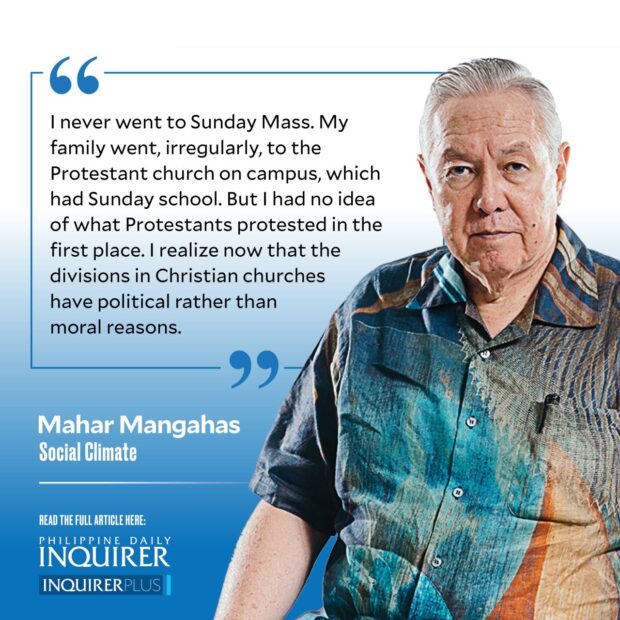Answering my own question
 It’s nearing expiration time, more or less, for my age cohort (born in the 1940s). Monthly, if not weekly, there’s a close relative, friend, or classmate who departs for the next world.
It’s nearing expiration time, more or less, for my age cohort (born in the 1940s). Monthly, if not weekly, there’s a close relative, friend, or classmate who departs for the next world.
Albert F. del Rosario. First of all, let me pay tribute to the great Filipino patriot. Albert F. del Rosario, who left us unexpectedly last Tuesday. My colleagues and I of Social Weather Stations had the pleasure, privilege, and honor of conducting public opinion research for him on issues regarding the West Philippine Sea. My daughter Angelica (Ph.D. candidate, international relations) had the good fortune of being one of his assistants. We pray for him and the Del Rosario family.
Last week, I asked, “Are prayers answered?” (4/15/23), and ducked answering, on the excuse of not, or at least not yet, having pertinent survey data. My personal answer, from my own experience, is Yes. I decline to dwell on what I have prayed for, or what the answers have been. Certainly, I am encouraged to keep on praying.
Does religion matter? I should explain that I consider myself an accidental Catholic. Born in a Protestant family (both parents’ sides), and baptized as such, at birth. Accidentally put in the Ateneo de Manila grade school on Padre Faura street, since the University of the Philippines (UP) Diliman campus where we lived didn’t have a grade school yet. For a time, my father and I roomed at the YMCA, behind Manila city hall; later he and I lived with friends in Paco. We went home on weekends; sometimes we commuted by bus directly from Diliman.
And so I was rebaptized at the Ateneo, without being consulted about it. It was proposed by my Catholic godmother, a journalist like my father; perhaps my parents felt I would blend in better that way. I grew up Catholic in school, learning catechism and getting First Communion; but not Confirmation (it wasn’t offered, and I didn’t seek it).
At home I continued as Protestant, whatever that meant. I never went to Sunday Mass. My family went, irregularly, to the Protestant church on campus, which had Sunday school. But I had no idea of what Protestants protested in the first place. I realize now that the divisions in Christian churches have political rather than moral reasons.
I finished high school in Ateneo, by then in Loyola Heights, much closer to home, and for college went to UP, where free tuition was my privilege as a child of a faculty member (my mother, in the Conservatory, later College, of Music), thus becoming a Blue Maroon. I was eager to switch school, not for any dislike of Ateneo, but simply to escape the social handicap of being two years younger than my classmates, which is another story. As a UP freshman at 14, I was already tall enough to hide my age from my classmates, and thus socialize better with them.
Surveys on religion: encountering Andrew Greeley. In 1990, at the annual meeting of the International Social Survey Program (ISSP) in Graz, Austria, I first met the man who influenced my religious thinking the most: the American Andrew M. Greeley, sitting for Ireland at that time, when the main topic for discussion was the questionnaire for the 1991 ISSP survey on religion.
In his autobiography, Fr. Andrew Greeley (1928-2013) says he is simply a priest. His mission in life, a Catholic secular priest. Sociologist by training at the University of Chicago. Bestselling author of many novels, some called “erotic”; read them, enjoy, and learn. “Jesus taught by telling stories; if I have an ability to tell stories, I should do so too.” He advocated marriage for priests: “Saint Peter was married—Jesus went to heal his sick wife!” He began his daily prayer journal with: “My Dearest Love.” He was equally prolific in sociology proper.
Life after death. In his book, “Eternal life?”, the priest Hans Kung argues that he finds no scientific evidence that death is the end of a person’s existence. On the other hand, in “Why I am not a Christian,” the philosopher Bertrand Russell says the reason is because he finds no evidence for the continuation of life after death.
A fascinating book is: “That all shall be saved: heaven, hell, and universal salvation” (2019), by David Bentley Hart, an Eastern Orthodox scholar of religion, who works from original Greek texts. He argues that if God is the good creator of all, then he is the savior of all, without fail. Punishment of the sinful might be appropriate, but it need not be eternal.
My daily hobby, the saints. One of my references is “All Saints: daily reflections on saints, prophets, and witnesses for our time” (1997), by Robert Ellsberg. Though he is Catholic, Ellsberg’s list includes holy persons of many faiths, for instance Mohandas K. Gandhi, who knew the Bible but did not consider Christianity superior to his native Hinduism.
He also includes paleontologist Fr. Pierre Teilhard de Chardin, SJ, who held that Jesus Christ is both the Beginning and the End of history (Colossians 1:17), but was forbidden by the Vatican to teach this. (Father Teilhard died on Easter Sunday, 1955; uncanonized.)
———————
Contact: mahar.mangahas@sws.org.ph.




















